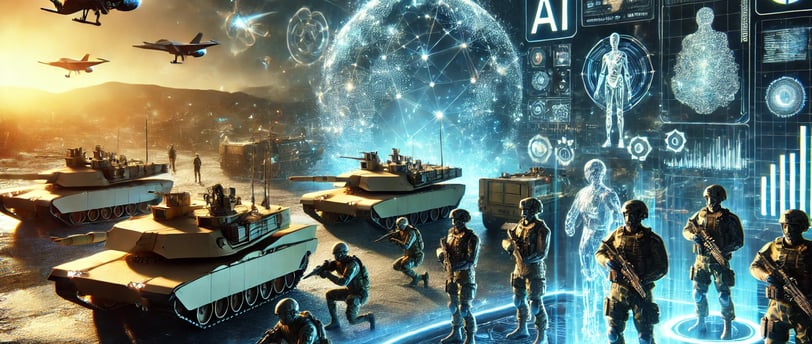The Future of Warfare: AI in Military Technology and Its Impact on Global Defense
Discover how AI in military technology is revolutionizing modern warfare. Explore AI-powered drones, autonomous weapons, cyber warfare AI, and the ethical concerns surrounding AI-driven military advancements.
2/21/20253 min read


Artificial intelligence (AI) is transforming every sector, and military technology is no exception. From autonomous weapons to cyber warfare AI, defense organizations worldwide are leveraging AI to enhance security, improve efficiency, and redefine modern warfare. However, with these advancements come critical ethical and strategic concerns.
In this article, we will explore the impact of AI in military technology, its applications, advantages, and the debates surrounding its use.
The Role of AI in Military Technology
AI is increasingly being integrated into defense systems to optimize decision-making, improve accuracy, and reduce human involvement in combat operations. Below are some of the key areas where AI is making a significant impact:
1. Autonomous Weapons
Autonomous weapons, also known as lethal autonomous weapons systems (LAWS), are designed to select and engage targets without human intervention. These systems use AI algorithms to identify threats and execute attacks with precision.
Benefits of Autonomous Weapons:
Faster response time in combat situations
Reduced risk to human soldiers
Increased accuracy and efficiency
Concerns:
Ethical implications of AI making life-and-death decisions
Risk of hacking and malfunction
2. AI-Powered Drones
AI-powered drones are transforming aerial surveillance, reconnaissance, and combat strategies. These drones can operate independently, gather intelligence, and execute targeted strikes with minimal human intervention.
Key Uses of AI-Powered Drones:
Surveillance and reconnaissance missions
Target identification and elimination
Border security monitoring
3. Cyber Warfare AI
With the rise of digital threats, AI is playing a crucial role in cyber warfare. AI-driven cybersecurity systems can detect and neutralize cyber threats faster than traditional methods.
How AI Enhances Cyber Warfare:
AI-driven threat detection and response
Automated network monitoring
Predictive analytics to prevent cyber-attacks
4. AI in Battlefield Surveillance
AI-powered surveillance systems use real-time data analytics, image recognition, and sensor fusion to enhance battlefield awareness.
Advantages:
Real-time enemy tracking
Improved situational awareness
Predictive threat analysis
5. Smart Defense Systems
Smart defense systems integrate AI with existing military infrastructure to enhance security and efficiency.
Examples of Smart Defense Systems:
AI-driven missile defense systems
Automated border control
Smart naval defense mechanisms
6. Predictive Analytics in Warfare
Predictive analytics in warfare helps military forces anticipate threats and make informed strategic decisions. AI algorithms analyze vast amounts of data to predict enemy movements and potential conflicts.
Applications of Predictive Analytics:
Identifying enemy strategies
Forecasting potential attacks
Optimizing troop movements
7. AI-Driven Military Robotics
Military robotics powered by AI are revolutionizing ground combat and logistics. These robots can perform a variety of tasks, from carrying supplies to engaging in combat operations.
Uses of AI-Driven Military Robotics:
Bomb disposal
Autonomous combat units
Logistics and supply chain management
8. Lethal Autonomous Weapons Systems (LAWS)
LAWS operate without human intervention and are designed to engage in combat autonomously. While they provide tactical advantages, they also pose serious ethical concerns.
Challenges of LAWS:
Lack of accountability in warfare
Potential for misuse and escalation
International legal implications
9. AI in Tactical Decision-Making
AI is being used to assist military leaders in making data-driven decisions. AI systems analyze real-time data from multiple sources to provide actionable insights.
How AI Enhances Tactical Decision-Making:
Faster data processing and analysis
Improved coordination among defense forces
Enhanced strategic planning
10. AI-Powered Reconnaissance
AI-powered reconnaissance systems enhance intelligence gathering through real-time data analysis, drone surveillance, and satellite imaging.
Benefits:
Enhanced threat detection
Faster decision-making in combat
Greater accuracy in intelligence gathering
The Ethical and Strategic Concerns of AI in Military Technology
While AI provides numerous advantages, its integration into military operations raises several ethical and strategic concerns.
1. Accountability and Responsibility
Who is responsible if an AI system makes a wrong decision? Autonomous systems lack human intuition, raising questions about accountability in warfare.
2. Risk of AI Warfare Escalation
The deployment of AI-driven military technology could lead to an arms race, increasing global tensions and the likelihood of AI-driven conflicts.
3. Threat of AI Hacking and Misuse
AI systems, if hacked or misused, could pose catastrophic risks, potentially leading to unintended conflicts or security breaches.
4. Ethical Dilemmas in Autonomous Warfare
The use of AI in combat raises ethical concerns about the morality of allowing machines to make life-and-death decisions.
Conclusion
AI in military technology is shaping the future of warfare, offering enhanced security, efficiency, and strategic advantages. However, as these advancements continue, it is crucial to address the ethical, legal, and security challenges that come with AI-driven military systems.
As global superpowers race to develop AI-driven defense solutions, the conversation around responsible AI use in military applications must remain at the forefront. The future of AI in military technology depends on finding a balance between innovation and ethical responsibility.
What are your thoughts on AI in military technology? Do the benefits outweigh the risks? Share your opinions in the comments below!
AI ZENTRO
Stay updated with the latest AI innovations today.
AI ZENTRO © 2025. All rights reserved.
